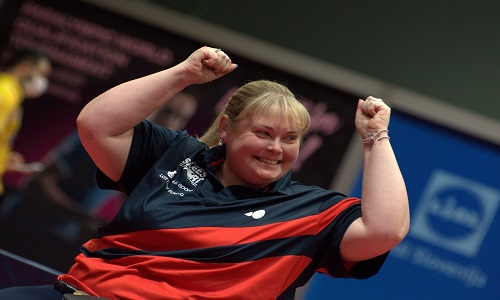Sue Bailey MBE chats to the online community about the Paralympics, life with Ehler's Danlos + more.

At the beginning of July, I was lucky enough to speak with Sue Bailey (Née Gilroy) MBE, Team GB Table Tennis Paralympian 2021.
From her early life with Ehler’s Danlos syndrome to why the Olympics and Paralympics should unify, Sue gave an honest account of the reality of being an elite disabled athlete. Read on to find out more. 
More about Sue
Hailing from Barnsley, South Yorkshire, Sue is not only a Primary School teacher and SENDCO, but also a much-celebrated five times Paralympian. With an impressive list of accolades, Sue can count the following as achievements gained in her sporting career:
- Two Commonwealth gold medals, a World Championship Silver and 2 Bronze medals and four European Championship medals – Gold, Silver and 2 bronzes including a silver won whilst 7 months pregnant with her daughter, Lauren! She has also been the British National Champion for 23 years along with winning hundreds of International Medals over her career.
- Twice named BBC Disabled Sportsperson of the Year for Yorkshire and Lincolnshire.
- An MBE awarded in 2009 for services to table tennis, youth work, coaching and charity work.
- An honorary doctorate awarded by Sheffield Hallam University in 2009.
What makes these all the more impressive is Sue lives with Ehler’s Danlos Syndrome, Fibromyalgia, Chronic Pain Syndrome, bones missing in both legs, a fused right wrist along with other neurological issues that significantly impact her everyday life.
Our chat
Doing my very best Michael Parkinson impression and armed with questions posed by our community members, I asked Sue about her life as a disabled sports-star, the impact of COVID-19 on Tokyo training and what more could be done to attract disabled people into sport.
Visit this YouTube video to hear Sue’s thoughts.
More on Sue’s life off court
- What sparked your interest in table-tennis, and have you always had a natural talent?
“I’ve always been more into your bat and ball skills, but my mum and dad used to play table-tennis in the Sheffield able-bodied league. So, when I was 7, I used to insist on going to watch them play in the league and I really wanted to play and enjoyed it. My dad started coaching me from a young age, before I used a wheelchair, and I started playing in the league and won a competition at 15 but by then my knees had started dislocating and I was falling a lot and injuring my wrists, so I actually retired at 15 and went into a wheelchair at 18 full-time.
After a few years I saw a disabled sports club, went down there and had a go at different sports in the wheelchair. I played basketball, wheelchair hockey as well but then I started table-tennis again and for the first month I couldn’t get the ball over the net because you’re much lower in a wheelchair so that was a nightmare. Then I took up archery and shooting. For 2 years I did archery, shooting and table tennis to quite a high standard until I was spotted by GB at a competition I’d won and they discussed if I wanted to take my sport to the next level then I had to choose which sport I wanted to do as I wouldn’t be able to train in all three with the hours needed, so I went with the one I loved… so it was my mum and dad’s fault really!”
- A lot of the members who visit our community are starting to use a wheelchair and are scared about that change to their life. It’s a period of adaption, isn’t it? How did having a wheelchair impact your life?
“For several years I felt like my life had just come to an end because I had to leave University and transfer back up here, I was a drummer in a rock band, and I couldn’t get on the stage anymore. I used to travel around the world in an orchestra playing flute, as-well as doing my sports. So, for me it was just so difficult when I went into a wheelchair… I was engaged at the time, and the day I found out I was going to be in a wheelchair for the rest of my life, we split up because he said it was embarrassing me always falling down before I’d even had a drink. So, it was very challenging, and it is difficult coming to accept that you are using a wheelchair, you can’t get around like other people and just life in general if you are in a wheelchair is difficult. There just isn’t the access.
It’s adapting and coming to terms not only with your disability, but initially I let my disability rule my life. I turned that around and thought, actually, I don’t want my disability to control my life. I want to show my children what I can do in a wheelchair. It’s a very difficult time during the transition time, it’s persevering and changing your mindset – there’s nothing you can’t do from being in a wheelchair, you just have to do it slightly differently.”
- Do you have any favourite memories of Paralympics gone by? And what are your hopes for this year?
“My favourite Paralympics was Sydney which was my first. That is such an amazing place and we stopped on for 3 weeks after that, me and my children, which was fantastic. Obviously, London was really special because you’re competing in front of a home crowd which is so different when people are cheering for you and not against you! I loved Beijing and Rio particularly as I came 4th in Rio and that was the best I’d done. They changed the ruling a few weeks after where both players would get a bronze medal, so I would have actually got a bronze medal now because you don’t have to play off for bronze. So, the Paralympics is the only medal that’s eluded me… and I’m still desperately trying to get in memory of my father.
This time I have a team partner so hopefully, I’ve only ever been able to play a team event once and that was in Beijing, so everything doesn’t focus on the singles, and I can relax a bit more and not put everything on those matches which puts you under more pressure because you know you have that team event as well. It’s very rare in all my years I’ve been able to do that, so I’m looking forward to the team event.”
Over to you:
A huge thank you to Sue for her time and words, we will all be cheering you on in Tokyo! If anyone wants to leave a message of support for Sue below, feel free.
While thinking more about her interview:
- Can you relate to Sue’s feelings around transitioning to using a wheelchair?
- Which Paralympics have you most enjoyed over the years?
- What more do you think could be done to break down barriers and encourage disabled people to trying sport?
Let us know your thoughts.
Want to tell us about your experience on the online community? Talk to our chatbot and let us know.
Comments
-
I really enjoyed listening to this! Best of luck to Sue for Tokyo

-
Just to update everyone, the wonderful Sue got a bronze in the team table tennis event, beating the Jordanian team to a much deserved win alongside Megan Shackleton!
Bravo Online Community Co-ordinator
Online Community Co-ordinator
Want to tell us about your experience on the online community? Talk to our chatbot and let us know.Concerned about another member's safety or wellbeing? Flag your concerns with us.
Brightness
Categories
- All Categories
- 13K Start here and say hello!
- 6.6K Coffee lounge
- 104 Games lounge
- 416 Cost of living
- 4.3K Disability rights and campaigning
- 1.9K Research and opportunities
- 199 Community updates
- 9.3K Talk about your situation
- 2.1K Children, parents, and families
- 1.6K Work and employment
- 776 Education
- 1.7K Housing and independent living
- 1.4K Aids, adaptations, and equipment
- 615 Dating, sex, and relationships
- 363 Exercise and accessible facilities
- 737 Transport and travel
- 31.5K Talk about money
- 4.3K Benefits and financial support
- 5.2K Employment and Support Allowance (ESA)
- 17.1K PIP, DLA, and AA
- 4.9K Universal Credit (UC)
- 6.3K Talk about your impairment
- 1.8K Cerebral palsy
- 868 Chronic pain and pain management
- 180 Physical and neurological impairments
- 1.1K Autism and neurodiversity
- 1.2K Mental health and wellbeing
- 319 Sensory impairments
- 824 Rare, invisible, and undiagnosed conditions
 https://youtu.be/DG9c08QFRis
https://youtu.be/DG9c08QFRis